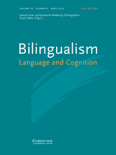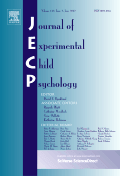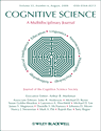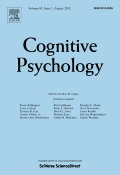
Journal of Cognition and Development
Scope & Guideline
Fostering innovation in cognitive processes and educational practices.
Introduction
Aims and Scopes
- Cognitive Development in Early Childhood:
The journal prioritizes research investigating cognitive development during early childhood, exploring how children understand concepts, reason, and solve problems. - Language Acquisition and Development:
A significant focus is placed on how children acquire language, including the role of parental interaction and socio-cultural factors in language development. - Mathematical Cognition and Skills:
The journal addresses the development of numerical understanding and mathematical skills, emphasizing the influence of various cognitive and environmental factors. - Social Cognition and Theory of Mind:
Research on how children perceive social cues, develop empathy, and understand others' mental states is a core area of interest. - Cognitive Control and Executive Functions:
The journal explores the development of executive functions, including inhibitory control, working memory, and cognitive flexibility, particularly in relation to academic success. - Cultural Influences on Cognition:
A unique aspect of the journal is its emphasis on how cultural contexts shape cognitive development, including studies on bilingualism and cultural practices. - Interdisciplinary Approaches:
The journal encourages the use of interdisciplinary methodologies, integrating insights from psychology, education, neuroscience, and sociology.
Trending and Emerging
- Impact of Socioeconomic Factors on Development:
Recent publications increasingly examine how socioeconomic status influences cognitive and emotional development, highlighting disparities and advocating for inclusive research practices. - Integration of Technology in Learning:
There is a growing interest in how digital tools and technology affect children's cognitive development and learning processes, particularly in educational settings. - Interdisciplinary Research Methodologies:
The journal is increasingly featuring interdisciplinary studies that combine cognitive psychology with neuroscience, education, and cultural studies. - Focus on Mental Health and Well-being:
Emerging themes include the relationship between cognitive development and children's mental health, emphasizing the importance of psychological well-being in educational contexts. - Diversity and Inclusion in Research:
There is a noticeable trend toward diversifying research subjects and methodologies, with an emphasis on inclusivity in developmental research. - Role of Play in Cognitive Development:
Research exploring the significance of play in fostering cognitive skills and social learning is gaining traction, reflecting a broader recognition of play's importance in development.
Declining or Waning
- Traditional Theories of Cognitive Development:
Research grounded in classical cognitive developmental theories (e.g., Piagetian frameworks) seems to be less frequent, as newer, more nuanced approaches gain traction. - Focus on Western Contexts:
There is a noticeable shift away from studies exclusively situated in Western contexts, with emerging research prioritizing diverse cultural perspectives. - Static Models of Learning:
The journal appears to be moving away from static models of cognitive learning and development, favoring dynamic, context-dependent approaches. - Individual Differences in Isolation:
Research solely focused on individual differences in cognitive abilities, without considering environmental or cultural contexts, is becoming less common.
Similar Journals

Constructivist Foundations
Empowering Scholars to Transform Educational LandscapesConstructivist Foundations is a distinguished academic journal dedicated to exploring the intersection of constructivist theories and interdisciplinary applications. Established in 2010 and published by ALEXANDER RIEGLER in Belgium, this journal aims to provide researchers, educators, and professionals with a platform to disseminate innovative ideas about learning, cognition, and scientific philosophy. With a focus on artificial intelligence, cognitive neuroscience, education, and the history and philosophy of science, Constructivist Foundations has made strides in contributing to meaningful discussions within these Q2 and Q3 ranked fields. Although it currently holds a Q4 status in several areas, it plays a crucial role in fostering knowledge and dialogue among scholars, thereby enhancing the understanding of constructivist principles across various domains. With robust academic engagement and open access options, this journal continues to shape the future of educational and cognitive research.

Cognitive Neuroscience
Unraveling the Mysteries of CognitionCognitive Neuroscience is a pivotal journal in the ever-evolving field of cognitive neuroscience, published by Routledge Journals, Taylor & Francis Ltd, in the United Kingdom. Since its inception in 2010, this journal has dedicated itself to publishing innovative research that explores the intricate relationships between neural mechanisms and cognitive processes. With an increasing focus on interdisciplinary studies, it addresses critical issues from both theoretical and empirical perspectives. Although it currently holds a Q3 ranking in the Cognitive Neuroscience category, it has made significant strides in its Scopus ranking, now positioned at #62 out of 115, reflecting its growing impact on the academic community. Researchers and professionals will find the journal an invaluable resource for staying updated on the latest findings and methodologies in the field. While the journal operates under a traditional access model, it ensures high visibility and dissemination of crucial research that shapes our understanding of the brain's role in cognition. As it continues to evolve through to 2024, Cognitive Neuroscience remains committed to fostering collaboration and inspiring future innovations within the discipline.

Neuropsychologia
Fostering Knowledge in Behavioral and Cognitive NeuroscienceNeuropsychologia, published by PERGAMON-ELSEVIER SCIENCE LTD, is a premier journal that delves into the intersections of psychology and neuroscience, specifically focusing on behavioral and cognitive processes. Since its inception in 1963, this esteemed journal has been a vital platform for researchers, professionals, and students, showcasing innovative studies and advancements in the fields of Behavioral Neuroscience, Cognitive Neuroscience, and Experimental Psychology. With a commendable impact factor, placing it in the Q2 category across multiple disciplines, Neuropsychologia is recognized for its contribution to the scientific community, ranking among the top journals in both Experimental and Cognitive Psychology and Neuroscience. The journal's commitment to excellence is evident in its rigorous peer-review process and its mission to disseminate cutting-edge research, making it an invaluable resource for those seeking to expand their knowledge and insights in neuropsychology. For further reading, the journal is accessible in both print and digital formats, ensuring that researchers can easily engage with the latest findings and theoretical advancements in this dynamic field.

Bilingualism-Language and Cognition
Fostering Dialogue in Language and Cognitive ResearchBilingualism-Language and Cognition, published by Cambridge University Press, is a leading journal in the fields of Education and Linguistics, renowned for its rigorous academic contributions and influential research. With an impressive impact factor placing it in the Q1 quartile of both fields, this journal ranks among the top-tier publications globally, reflecting its commitment to advancing the understanding of bilingualism and its cognitive implications. Since its inception in 2005, Bilingualism-Language and Cognition has garnered significant attention, evidenced by its remarkable Scopus rankings—11th in Language and Linguistics and 12th in Social Sciences. Dedicated to publishing high-quality original research, reviews, and integrative studies, the journal aims to foster interdisciplinary dialogue among researchers, educators, and practitioners. Although not currently an open access journal, it remains a vital resource for those engaged in bilingualism research and its cognitive dimensions, contributing to the academic landscape from its home in Cambridge, United Kingdom.

JOURNAL OF EXPERIMENTAL CHILD PSYCHOLOGY
Decoding the Complexities of Child DevelopmentJOURNAL OF EXPERIMENTAL CHILD PSYCHOLOGY, published by Elsevier Science Inc, stands as a premier outlet for high-quality research in the fields of Developmental and Educational Psychology and Experimental and Cognitive Psychology. With an impressive impact factor and recognized within the Q1 category for both developmental and experimental psychology, this journal is dedicated to advancing our understanding of child psychology through rigorous empirical research and theoretical contributions. Indexed with an ISSN of 0022-0965 and E-ISSN 1096-0457, it is a vital resource for scholars aiming to explore the complexities of children's cognitive, social, and emotional development from 1964 to 2024. Engaging with this journal provides researchers, professionals, and students access to cutting-edge findings that inform practice, policy, and future studies in the ever-evolving landscape of child psychology.

Language Cognition and Neuroscience
Fostering Interdisciplinary Dialogue in Language and NeuroscienceLanguage Cognition and Neuroscience is a premier peer-reviewed journal published by ROUTLEDGE JOURNALS, TAYLOR & FRANCIS LTD, focusing on the intersection of linguistics, cognitive psychology, and neuroscience. Since its inception in 2013, this journal has established itself as a vital resource for researchers and scholars, contributing significantly to the understanding of how language is processed and represented in the brain. With its impressive rankings in various categories—Q1 in Linguistics and Language, Q2 in Cognitive Neuroscience, and Experimental and Cognitive Psychology—it caters to a diverse and interdisciplinary audience. The journal is accessible to readers worldwide, effectively communicating cutting-edge research and innovative methodologies in the field. Open Access options enable broader disseminations of knowledge, ensuring that significant findings reach both academic and practical applications. With a commitment to high-quality research, Language Cognition and Neuroscience continues to be an influential platform for advancing theories and practices within cognitive science and language studies.

COGNITIVE SCIENCE
Unlocking the Mysteries of the MindCOGNITIVE SCIENCE, published by WILEY, is a leading academic journal that delves into the complexities of human cognition through an interdisciplinary lens. With an ISSN of 0364-0213 and an E-ISSN of 1551-6709, this journal has made significant strides in the field since its inception in 1977, ample coverage through to 2024, and a commendable Q1 and Q2 categorization in Experimental and Cognitive Psychology and Cognitive Neuroscience as of 2023. The journal is positioned at the intersection of various disciplines, ranking #65 out of 165 in Experimental and Cognitive Psychology and #58 out of 115 in Cognitive Neuroscience, highlighting its relevance and contribution to advancing knowledge in these areas. Although it does not offer open access, COGNITIVE SCIENCE remains an essential resource for researchers, professionals, and students seeking to explore groundbreaking research and theoretical insights within the vast domain of cognitive science.

Journal of Neuropsychology
Illuminating the Pathways of Cognitive NeuroscienceThe Journal of Neuropsychology, published by WILEY, is a premier academic journal dedicated to advancing the field of neuropsychology and its related disciplines. With a focus on behavioral and cognitive neuroscience, this journal presents cutting-edge research that informs our understanding of psychological functions and their underlying neural mechanisms. Operating with an impressive impact factor representative of its rigorous peer-review process, the journal has established itself within the Q2 and Q3 quartiles of multiple relevant categories, including Neuropsychology and Physiological Psychology. Researchers will find the ISSN 1748-6645 and E-ISSN 1748-6653 useful for academic referencing as they explore articles that span innovative methodologies and insights into neurological conditions. Published continuously since 2007, the Journal of Neuropsychology stands as a vital resource for professionals and students alike, fostering scholarly discourse and knowledge exchange in neuropsychological research.

TRENDS IN COGNITIVE SCIENCES
Innovating Knowledge in NeuropsychologyTRENDS IN COGNITIVE SCIENCES, published by CELL PRESS, stands as a premier platform for the dissemination of high-quality research in cognitive neuroscience, experimental psychology, and neuropsychology. With an impressive impact factor and consistently placed in the Q1 category across multiple dimensions of cognitive research, this journal not only ranks in the top tier of its fields—holding the 1st position in both Cognitive Neuroscience and Neuropsychology but also boasts an exceptional percentile ranking of 99. As it converges from 1997 to 2024, it reflects the evolving landscape of cognitive sciences, making it a vital resource for researchers, professionals, and students seeking to stay updated on influential trends and groundbreaking studies. Though not an open-access journal, TRENDS IN COGNITIVE SCIENCES offers readers access to a wealth of information that shapes our understanding of complex cognitive processes and behaviors.

COGNITIVE PSYCHOLOGY
Charting New Territories in Human CognitionCOGNITIVE PSYCHOLOGY is a premier academic journal published by Academic Press Inc. Elsevier Science, specializing in the dynamic and evolving field of cognitive psychology. With a significant history spanning from 1970 to 2024, this journal has established itself as a critical resource for researchers and professionals alike, boasting a distinguished ranking in the Q1 category across multiple disciplines, including Experimental and Cognitive Psychology, Neuropsychology, and Artificial Intelligence. Its impact factor, reflective of its influence and reputation within the academic community, positions COGNITIVE PSYCHOLOGY as an essential platform for disseminating cutting-edge research and theoretical advancements. Although it is not open access, subscribers gain exclusive insights into the latest findings that drive the field forward. The journal's commitment to fostering innovative research makes it an indispensable tool for those dedicated to understanding the complexities of human cognition.